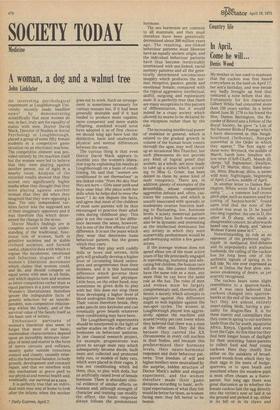Country life
In April, Come he
Denis Wood
My mother-in-law used to maintain that the cuckoo was first heard everywhere in the land on April 17, her son's birthday, and woe betide any badly brought up bird that ventured a note before that day. Fortunately for his reputation Gilbert White had concurred more than 150 years earlier. In a letter dated June 30, 1776 to his friend the Hon. Daines Barrington, the Recorder of Bristol and a Fellow of the Royal Society, he gave "a List of the Summer Birds of Passage which I have discovered in this Neighbourhood (Selborne), Ranged somewhat in the Order in which they appear." The first eight of these were: Wryneck, the middle of March, harsh note; Smallest willow-wren (Chiff-Chaff), March 23, chirps 'till September; Swallow, April 13; Martin, ditto; Sand-martin, ditto; Blackcap, ditto, a sweet wild note; Nightingale, beginning of April; Cuckoo, middle of April. In another letter to Daines Barrington, White wrote that a friend using ". . . a common half-crown pitch-pipe, such as masters used for tuning of harpsichords" found upon trial that the note of the cuckoo was most in D: he heard two sing together, the one in D, the other in D sharp, who made a disagreeable concert: he afterwards heard one in D sharp, and "about Wolmer Forest some in C". . . .
Notwithstanding its role as an opponent of the preferred nightingale in mediaeval bird-debates and its unpopularity with jealous husbands, the calling of the cuckoo has for long been one of the authentic signals of spring in its full tide. No one ever expressed as well as Delius the first slow, sensuous awakening of desire, as yet scarcely recognised.
The cuckoo bears some slight resemblance to a sparrow-hawk, and it was once believed that cuckoos changed into sparrowhawks at the end of the summer. In fact they are almost entirely insect-eating birds, having a partiality for dragon-flies. It is for these insects and caterpillars that they come in spring to our northern lands from the far south, equatorial Africa, Kenya, Uganda and even from the Cape. At this time too they find here longer hours of daylight for their unwitting foster-parents to collect food and feed young cuckoos. Here they chiefly live either on the outskirts of broadleaved woods from which they lay their eggs in the nests of hedgesparrows, or to open heath and moorland where the meadow-pipit is most often chosen as a fosterparent. Not long ago there was great discussion as to whether the female cuckoo laid the egg directly into the victim's nest or laid it on the ground and picked it up, either in its bill or in its claws and deposited it. It seems now generally agreed that the eggs are laid directly into the nests, but some maintain that they have found 'cuckoos' eggs in nests so placed that it would have been impossible for a bird as large as a cuckoo to get inside.
Now in silent springs, in pesticidal caterpillar famines, I scarcely ever hear the cuckoo where I live at Taplow; but when the war was over we bought a house at Cookham Dean in Berkshire, and moved in in April or May of, I think, 1946, when it seemed that nothing could ever go wrong with the world again, then the cuckoo called all day long, so much so that visitors came to call it Cuckoo Dean.
Stinging nettles are as it were 'Doctor-plants,' adding intensity of flavour to many herbs and also tomatoes when grown in close propinquity. Places from which nettles have been dug out, rather than callously poisoned, are found to have a high soil fertility. They are certainly sovereign in a compost, heating up well and full of nutrients. A cold infusion of nettles in water is a good mild fertiliser. Nettle soup pureed from young shoots is as fresh and delicious as spinach. Beside all this they are the chief, if not the only, food for caterpillars of Peacocks, Red Admirals and Tortoiseshell butterflies, in one of which there may sometimes be the distracted soul of a cruel mistress, fluttering in repentance over the grave of an ill-used lover, for I think nettles also grow above the tragic graves of suicides, those who killed themselves for love.
Wiseacres will tell you 'never mind the time of the year, wait until the soil is ready.' By this they mean when the soil is dry enough to be raked to a fine tilth, not sticky, not dusty, but crumbly, coming kindly to the rake. This year I have waited and waited, but no soil-structure miracle has been vouchsafed. All spring the rain never stopped, a dour soil has become colder and stiffer as each week passes and then, at Easter, snow. Even the slugs have got the sulks. In neardesperation I have put into peat pots the seeds of later broad beans, peas, and now even onion sets and shallots. I have had to go to the lengths of pricking seedling lettuces into baby one-and-a
half-inch pots in the greenhouse, to go for hardening into a cold frame as soon as even this can be considered safe from frost. If the soil ever gets ready, and I plant them out, I will take 100 to 1 that there will be a drought for forty days and I shall have to water _them.



































 Previous page
Previous page